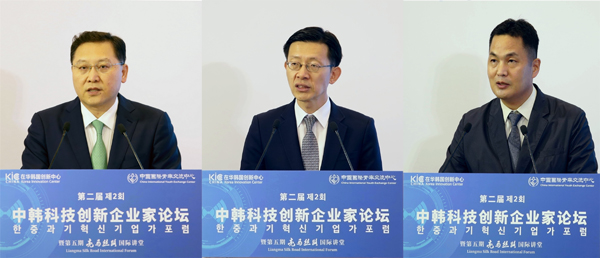CIYEC, KIC China Boost Tech-Inno Exchanges Between China, South Korea
The 2nd China-South Korea Tech-Inno Entrepreneur Forum and the 5th Liangma Silk Road International Forum were held simultaneously on August 4 in Beijing. The event, with some 460 participants from government, institutions, and enterprises in attendance online and offline, was co-organized by the China International Youth Exchange Center (CIYEC) and the Korea Innovation Center (KIC China).
Themed as new opportunities for innovative cooperation in information and communications technology (ICT) between young entrepreneurs of China and South Korea, it was also supported by the Embassy of South Korea in China, the Ministry of Science and ICT of South Korea, the Beijing Daxing International Airport Economic Zone Administrative Committee, the South Korea-China ICT Association, the Born2Global Center (a main Korean government agency under the Ministry of Science and ICT), and the Korea Chamber of Commerce in China (KCCI).

Guests address the 2nd China-South Korea Tech-Inno Entrepreneur Forum held in Beijing on August 4.
CIYEC Director Zhang Hua said as the digital economy has become a main driving force for economic development in the process of global economic recovery, young people, as the main force driving technological process, supply a key impetus of deepening digital economy cooperation globally.
Zhang stressed that CIYEC has always attached importance to China-South Korea exchanges and is committed to building a new platform for youth cooperation in science, technology, innovation and economy and trade. He hoped that the youth of the two countries will cooperate for mutual benefit and take concrete actions to promote the development of China-South Korea ties.
The two countries have made breakthroughs in cooperation in various fields during the past three decades, said Nho Kyoung-weon, Minister-Counsellor of the Embassy of South Korea, adding that this year marks the 30th anniversary of China-South Korea's diplomatic ties. Young entrepreneurs of the two countries should enhance cooperation in artificial intelligence, big data, cloud technologies, healthcare, and climate change, he added.
Kim Jong-moon, Director of KIC China, said that the center will lead more small and medium-sized enterprises to enter the Chinese market, and further expand bilateral cooperation in science and technology innovation. To illuminate the center's work plan, he noted that KIC China will promote sci-tech exchanges and cooperation between young entrepreneurs of the two countries, with a focus on the Beijing-Tianjin-Hebei region, the Yangtze River Delta region, the Guangdong-Hong Kong-Macao Greater Bay Area, and the Chengdu-Chongqing Economic Circle.
Zhao Gang, Director General of the Global Innovation Center and Vice President of the Chinese Society for Social and Economic System Analysis, explained the policy and development plan of the ICT industry in China.
He also emphasized that China owns 1,454 AI enterprises, ranking second in the world to the 2,257 of the US, with most of them located in Beijing, Shanghai, Guangdong, and Zhejiang; 537 are in Beijing and 296 in Shanghai, according to the China Internet Development Report (2021).
Chih-Lin I, CMCC Chief Scientist at the China Mobile Research Institute, said China had over 1.42 million 5G stations by the fourth quarter of 2021, and is expected to complete the distribution of 2 million 5G stations by the end of 2022.
She also shared the deep integration development trends of information communication distribution transaction (ICDT), noting that wireless access with extreme capabilities, distributed intelligent networks with simplified yet flexible protocol stacks, all spectrum three-dimensional global coverage, pervasive intelligence, and digital twin network-enabled autonomous operation are trends that will emerge in the era of 6G networks.
Guests including Joo Seung-woo, President of the South Korea-China ICT Association, Wang Lunmao, Director of Investment of the Beijing Daxing International Airport Economic Zone, Li Yugen, Professor of the School of Integrated Circuits at Tsinghua University, and Kim Chul-moo, Director of the Management Research Institute of Hyundai Motor Group (China), gave ICT-themed speeches at the forum.
Executives of innovative companies of both countries also shared respective products and developing plans, and had in-depth exchanges on further promoting ICT technology and industrial cooperation at the forum.
Participants of the two countries spoke highly of the forum. They said that new impetus is required for global economic recovery, and in the context of increasing instability, uncertainty and insecurity in the international situation, unprecedented international cooperation is all the more necessary for world economic development.
The exchanges between China and South Korea at all levels in the ICT sector are conducive to technological cooperation between the two countries and stable and secure industrial and supply chains, and also ensure the sound momentum of bilateral economic and trade relations.
